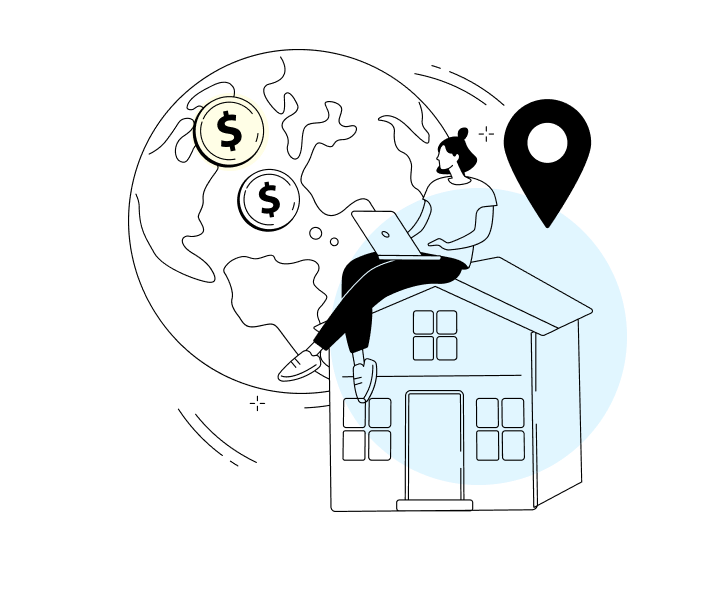Switch to TurboTax and get the expert help you need for only $60.
The USA/Canada Tax Treaty Explained
TurboTax Canada
January 21, 2025 | 6 Min Read
Updated for tax year 2025

Are you a US citizen living and working in Canada? Maybe you’re a dual resident and not sure which tax rules to follow. Perhaps you’re a US citizen who crosses the border every day to work for a Canadian company. There are lots of opportunities for cross-border income, which makes understanding the US/Canada Tax Treaty vital for those who plan to take advantage.
But filing your taxes in one country can be difficult enough. Not to mention the US tax system has one of the most complex tax codes in the world. So figuring out your taxes in both Canada and the States can be a little challenging.
The good news is, we’ve got answers. The information that comes next will help you make sense of how your taxes work as an American living or working in Canada and making an income under the Canada-US tax agreement.
Key Takeaways
- Canada and the U.S. have a tax treaty to prevent double taxation for Canadian residents earning U.S. income and U.S. citizens working and living in Canada.
- Regardless of your citizenship, you have to pay Canadian income tax if you live and work in Canada.
- The U.S. bases taxation on both your residence and citizenship status. In Canada, your tax obligations are based on your residency status, which the CRA can help you determine.
Defining the US/Canada Tax Treaty and its benefits
Under the treaty, both the US and Canada allow a foreign income tax credit for any income tax paid to the other country.
A main benefit of the treaty is to avoid Americans being responsible for taxes in two countries, thus paying taxes twice on the same income. (Not ideal!) The treaty also helps to prevent issues like tax evasion and help ensure fair tax treatment for all individuals and corporations.
What’s the difference between US and Canadian tax rules?
The biggest difference between the two countries is that the US bases taxation on your citizenship status. This means American citizens must file a U.S. tax return every year, regardless of where they live or work.
In Canada, your tax obligations are based on your residency status. If you need any guidance, the Canada Revenue Agency (CRA) can help you determine your status. The general rule is that regardless of your citizenship, you’ll have to pay Canadian income tax if you live and work in Canada.
Does Canada have a tax treaty with the US?
Yes. Canada and the US have a tax treaty to prevent double taxation for Canadian residents with US income and US citizens working and living in Canada. While both US citizens and Canadian residents have to report their foreign income regardless of where they file their tax returns, the treaty saves US folks from being taxed by the US on income earned and taxed in Canada.
But there’s not much room for error. For the Canada-US tax treaty exemption, you should complete the US 1040 federal tax return accurately and on time. Otherwise, you could face double taxation, denial of legitimate expenses, interest charges, or penalties on incomplete or inaccurate forms. But the US 1040 may not be needed in all instances. For example, Canadian citizens may receive US income with taxes withheld and not be required to file a US return.
How do I qualify for US tax treaty benefits?
How you get taxed by the CRA comes down to your residential ties. You have signifiant residential ties in Canada if you have a home, spouse, common-law partner, or dependants in Canada. There are secondary residential ties, as well, that could come into play.
Knowing your residential status under the treaty is important because the US and Canada tax their residents on worldwide income, as mentioned. But non-residents are taxed only on income that is sourced domestically. So in this instance, a US resident would claim the benefits of the US/Canada Tax Treaty on their Canadian-source income.
Here are four common cross-border income scenarios where the Canada-us tax treaty benefits could come into play:
1. You live and work in Canada as a US citizen
As a U.S. citizen living and working in Canada, you’re taxed by Canada on money earned in Canada. This includes income you earn from being an employee at a company operating in Canada as well as any interest you earn from investing in Canadian stocks, bonds, or mutual funds. However, if you are a US citizen but a Canadian resident for tax purposes, then you are taxed on worldwide income—not just income you earned in Canada.
As a Canadian resident, you get taxed on your worldwide income, regardless of where it came from. This means you’ll have to declare all foreign and domestic income on your personal tax return. TurboTax can help you accurately report multiple sources of income from different countries.
While scenarios can be more complicated with individuals who maintain homes in both countries, the situation is straightforward for US expats who live and work in Canada with a limited physical presence in the US. If you stay in Canada for 183 days or more in a tax year, do not have significant residential ties to Canada, and are not considered a resident of another country under a tax treaty with Canada, then you would be considered a deemed resident of Canada for tax purposes.
If you’re working in Canada, but for a US company, and you’re paid by the US company, employment income is exempt from Canadian taxation as long as you’re not residing in Canada.
2. You live and work in Canada for only part of the year as a U.S. citizen
In this scenario you may or may not be considered a resident of Canada for tax purposes. The CRA takes a good look at your residential ties to Canada, how long you have been in the country, where you normally live, and several other factors to determine your residency status.
If you’re an American who worked in Canada for a non-resident employer and lived there for 182 or fewer days, or if you earned under $10,000 working for a non-resident employer, you do not have to pay Canadian taxes.
However, as noted above, you’re considered a deemed resident if you stayed in Canada for 183 days or more during the tax year and will be taxed on your Canadian-source income. (This holds true if you did not have significant Canadian residential ties and were not considered a resident of another country.)
3. You live in the US and cross the border for work every day
Daily commuters crossing the border to work are common, so it’s possible for a US citizen to be a US resident while earning income in Canada.
As a non-resident in Canada, you’re required to pay Canadian tax only on Canadian sources of income. But under the income tax treaty between Canada and the US, you may be able to avoid Canadian taxation on exempt income and may apply for exemption on withholding of tax from Canadian sources. Generally, you would need to show that the withholding amount is more than the potential Canadian tax liability.
4. You’re a resident of both the US and Canada
As both a resident of the US and Canada—meaning you have a home in and are considered a resident of both countries—you’ll likely file both Canadian and US tax returns, which could lead to double taxation. Luckily, the tax treaty provides provisions and relief in these situations, so you’ll likely pay taxes only in the country in which you have established the strongest ties and receive credits from the other for the taxes paid.
If you work in Canada, but for a non-resident US company that pays you in USD, as long as you don’t live in Canada, you won’t have to have to pay Canadian taxes for that employment income.
If you work for a Canadian company that pays you, you have to pay Canadian tax on this income, even though you live outside Canada.
If you’re not sure of your residency status in Canada, contact the CRA at 1-800-959-828.
US/Canada Tax Treaty exemptions and rules
Here are a few more common points surrounding withholding rates, exempt amounts, and tie breaker rules for the US Canada Tax Treaty include:
What is the withholding rate and exempt amount for the US/Canada Tax Treaty?
US dividends paid to foreign (non-US citizen) investors are generally subject to a 30% withholding tax. Under the US/Canada Tax Treaty, the withholding rate may be reduced to only 15%.
US citizens who make under $10,000 in income in Canada and are classified as non-residents of Canada do not have to pay income tax in the country. This only applies to employment income from a non-resident employer.
What is the tie breaker rule for the US/Canada Tax Treaty?
If you reside in both Canada and the US, the tax treaty provides tie-breaker rules to determine which country you are a resident of for tax purposes. If your key interests (where you have a permanent home and biggest personal and economic interests) are closer to Canada and you don’t have the same kind of ties in the US you can essentially “tie break” to Canada. A tie breaker means under the tax treaty you can be treated as a non-resident of the US for tax purposes.
Your taxes are done right, any way you choose.
File on your own, with live help, or hand your taxes off to an expert.
Get StartedDefining the US/Canada Tax Treaty and its benefits
What’s the difference between US and Canadian tax rules?
Does Canada have a tax treaty with the US?
How do I qualify for US tax treaty benefits?
1. You live and work in Canada as a US citizen
2. You live and work in Canada for only part of the year as a U.S. citizen
3. You live in the US and cross the border for work every day
4. You’re a resident of both the US and Canada
US/Canada Tax Treaty exemptions and rules
What is the withholding rate and exempt amount for the US/Canada Tax Treaty?
Related articles

© 1997-2024 Intuit, Inc. All rights reserved. Intuit, QuickBooks, QB, TurboTax, Profile, and Mint are registered trademarks of Intuit Inc. Terms and conditions, features, support, pricing, and service options subject to change without notice.
Copyright © Intuit Canada ULC, 2024. All rights reserved.
The views expressed on this site are intended to provide generalized financial information designed to educate a broad segment of the public; it does not give personalized tax, investment, legal, or other business and professional advice. Before taking any action, you should always seek the assistance of a professional who knows your particular situation for advice on taxes, your investments, the law, or any other business and professional matters that affect you and/or your business.









